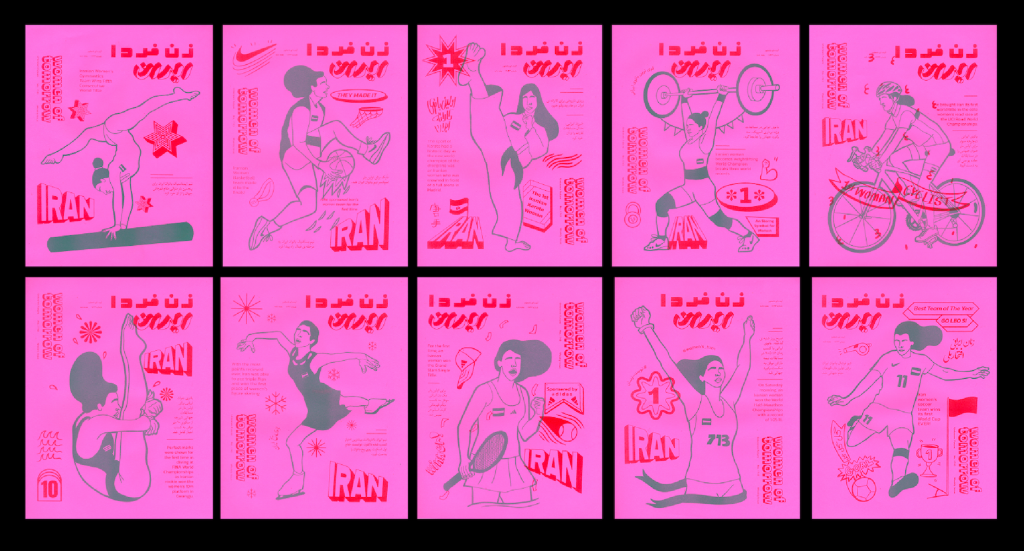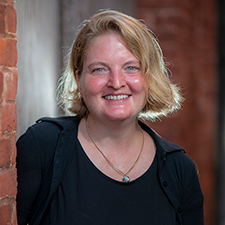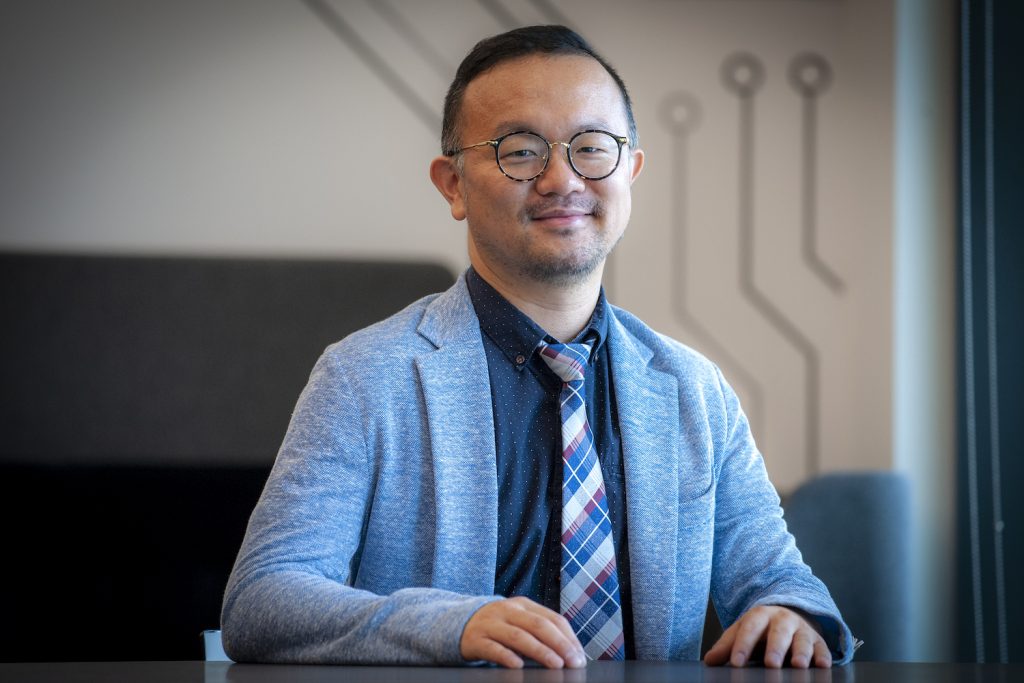
When Sangsun “Sam” Choi was interviewed earlier this year for his new position as an assistant professor of media production in the Department of Communication at Augusta University, he wasn’t able to have an in-person visit due to the COVID-19 pandemic.
But after taking the time to learn about Augusta University and the surrounding area, Choi said he was eager to become a faculty member here.
“My impression was excellent. The weather was beautiful and I enjoyed the cultural diversity in Augusta,” said Choi, an award-winning documentarian and photographer who is originally from South Korea. “I noticed that there were so many people from diverse backgrounds, so I could easily expect that there would be various unique stories that I might be able to record through a camera.”
This past week, about 85 new faculty members of Augusta University attended orientation at the Georgia Cyber Center. This event is meant to provide new professors and faculty members with all the information and support they need to have a wonderful experience and a successful career at Augusta University, said Dr. Kathy Browder, associate provost for Faculty Affairs.
“I think new faculty orientation is one of the most important things that we do for faculty because we need to help them get off to a good start,” Browder said. “It’s one of the few times that they get to meet faculty from other units, from other colleges and from other campuses. It’s a great way for them to learn about the unique culture and community that Augusta University has to offer.”
As a new assistant professor of media production at Augusta University, Choi said he can’t wait to explore everything Augusta has to offer. In his award-winning documentaries, Choi said he often focuses on an ethnographic approach to social minorities and vulnerable people around the world.
“My creative research focuses on documentary production, especially with regard to underrepresented people such as child workers, refugees, immigrants, North Korean defectors and minorities,” he said, adding his documentaries explore not only the value of truth, but also an artistic representation of human life. “My filmmaking process involves shifting back and forth between an outsider’s viewpoint and an insider’s life experience.”
Choi was an assistant professor of media production at Malone University in Ohio for the past five years, where he taught media production and digital photography classes. He also developed a new academic curriculum and directed a film festival at the university.
His documentaries have been presented at film festivals worldwide, including Athens International Film and Video Festival, Big Sky Documentary Film Festival, RiverRun International Film Festival, Rochester International Film Festival and the ETHNOCINECA-International Documentary Film Festival Vienna.
Choi is also a two-time winner at the Broadcast Education Association Festival of Media Arts with the Best of Festival-King Foundation Award in 2020 and the Best of Competition Award 2018. He is also the recipient of the Distinguished Faculty Award for Scholarship at Malone University in 2019.
“Communicating with an audience is a critical goal of my documentary production. Therefore, I believe that the final stage of making a film is not post-production but releasing it to reach out to diverse people,” Choi said. “As an eyewitness to someone’s life through a viewfinder, my goal is not to stay as just a bystander but to invite the audiences to social participation by opening their hearts through my original story.”
Choi remembers the moment he was inspired to become a filmmaker.
“I had the first opportunity to make a documentary in Cambodia when I was 20 years old. It was a story about the medical volunteer team working in a remote area,” Choi said. “While filming the team in a poor village, a local Cambodian child came to me and spoke Korean.”
The small child, speaking in Korean, said, “Hey brother, it’s not expensive. Just a dollar.” Choi was amazed that this child from Cambodia was speaking Korean.
“I was quite shocked because I didn’t expect such a situation and it was my first international trip. I was curious about the reason that she needed to learn Korean and her background story,” Choi said. “From that time on, I became interested in various people’s stories in the world and especially had a passion for making the voice for the voiceless.”
Choi hopes to bring his unique perspective to the students of Augusta University and help them become skilled storytellers.
“I always believe that a university is not just a one-dimensional place that trains a student for the vocation, but it is a dynamic location to shape worldviews and develop lifelong relationships,” he said. “With this idea in my mind, I want to teach my students to mature as self-directed people through instruction and devoted mentoring.”
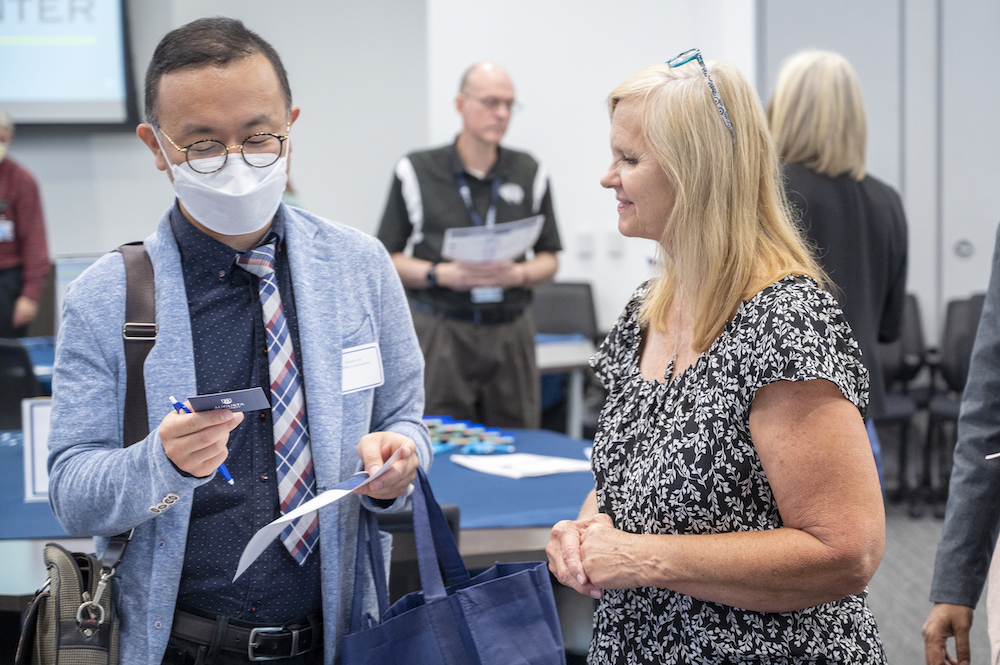
Dr. Jason Orlosky, a new associate professor in the School of Computer and Cyber Sciences, is familiar with Augusta University because he grew up in the area.
“Though I was born in Ohio, I have lived in Augusta since I was 6 years old,” Orlosky said. “After graduating high school here, I studied computer engineering at Georgia Tech, where I also held several part-time jobs in network support and research. Upon graduation in 2006, I went to work in health care IT, but left the industry in 2010 to study Japanese for several semesters at the University of Georgia.”
In 2011, Orlosky traveled to Osaka University in Japan as an exchange student and eventually became a research student and PhD student at Takemura Laboratory at the Cybermedia Center.
“Upon graduation, I became full-time faculty at Osaka University as a specially appointed researcher, assistant professor and finally, an associate professor,” Orlosky said. “These roles were funded by various grants and organizations, including the Japan Society for the Promotion of Science, Osaka University and most recently by the U.S. Office of Naval Research Global.”
Since 2014, Orlosky has been advising a team of students from undergrads to the PhD level at Osaka University.
“Though I will be full-time faculty at Augusta University moving forward, I will remain a ‘cross-appointed associate professor’ at Osaka University, which is a special role similar to an adjunct professor that is designed to encourage joint research and scholarship between international institutions,” he said. “This will allow me to continue advising my student team on a remote basis and visit Japan over the summers to conduct collaborative research.
“I see this as a fantastic opportunity to build a bridge between the educational systems of the United States and Japan.”
Some of Orlosky’s research goals include improving the safety and usability of augmented and virtual reality, promoting cross-functional and interdisciplinary research efforts, better understanding the human brain and its relationship with machines and improving the development of artificial intelligence.
“I currently lead efforts on a number of different projects, but I am particularly excited about two funded topics that we are exploring right now,” Orlosky said. “The first topic involves developing ‘cognitive symbiosis,’ which we define as the ability of artificial intelligent agents to empathize and respond to a human counterpart.
“Think of a small digital character that we can visualize in the real world using a head-mounted augmented reality display.”
While most people think of such characters as a novelty or something for entertainment, Orlosky said he sees them as having tremendous potential for education and training.
“Just as teachers, friends or parents can empathize with and support students or trainees, we are working on artificial intelligence-driven digital characters that can support learners in the same way,” he said. “To do so, we recognize cognitive states like anxiety or frustration using integrated eye tracking and sensors, pass those cognitive states as input into a neural network (or artificial intelligence), and then use that network to drive virtual characters that can better support human learning.”

As if that wasn’t fascinating enough, Orlosky said he is also studying how to develop co-located spaces in which remote collaborators can interact and learn using augmented and virtual realities (AR/VR).
“With applications like Zoom, Skype or Microsoft Teams, we still only get a 2D view of our remote collaborator’s world,” he said. “However, in the real world, we naturally use gestures, mutual gaze and body movement in 3D space to communicate and convey information.
“The goal of this project is to make use of AR and VR so that remote collaborators can better understand each others’ natural behaviors through visualization. Achieving this goal will improve usability and adoption of AR and VR technologies and will allow the development of more effective tools for remote learning.”
Orlosky said this particular project is a mutual effort between Augusta University, Vanderbilt University, Columbia University, Virginia Tech, Osaka University and other top institutions.
In his new position as an associate professor in the School of Computer and Cyber Sciences, Orlosky said he has three goals in mind.
“First, I would like to strengthen the school’s budding graduate student research community,” he said. “In Japan, research laboratories are made from tightly knit teams of undergraduate and graduate students who work, play and socialize in joint lab spaces.
“This fosters a fantastic environment for creativity and research, and I would like to bring many of these ideas to the graduate program in addition to establishing a joint-use laboratory space.”
Next, Orlosky said he would also like to continue expanding the school’s ongoing augmented and virtual reality research and build new interdepartmental collaborations.
“We already have several joint projects between the School of Computer and Cyber Sciences, the Medical College of Georgia, the Art Department and Medical Illustration, which are fantastic opportunities for CCS students to create interdisciplinary teams and at the same time learn about the needs of end-users in other professions,” he said. “And finally, I would like to expand the university’s international presence by building relationships with foreign institutions that can take advantage of our strengths in medicine and cyber sciences.”
Orlosky said it is an exciting time to be at Augusta University.
“Coming from the Cybermedia Center at Osaka University, I see great potential for growth and collaboration with the school’s existing cyber disciplines such as cybersecurity and cyber physical systems,” he said. “The realm of ‘cyber’ is very diverse, and I am looking forward to adding my area of expertise to Augusta’s rapidly expanding cyber know-how.”
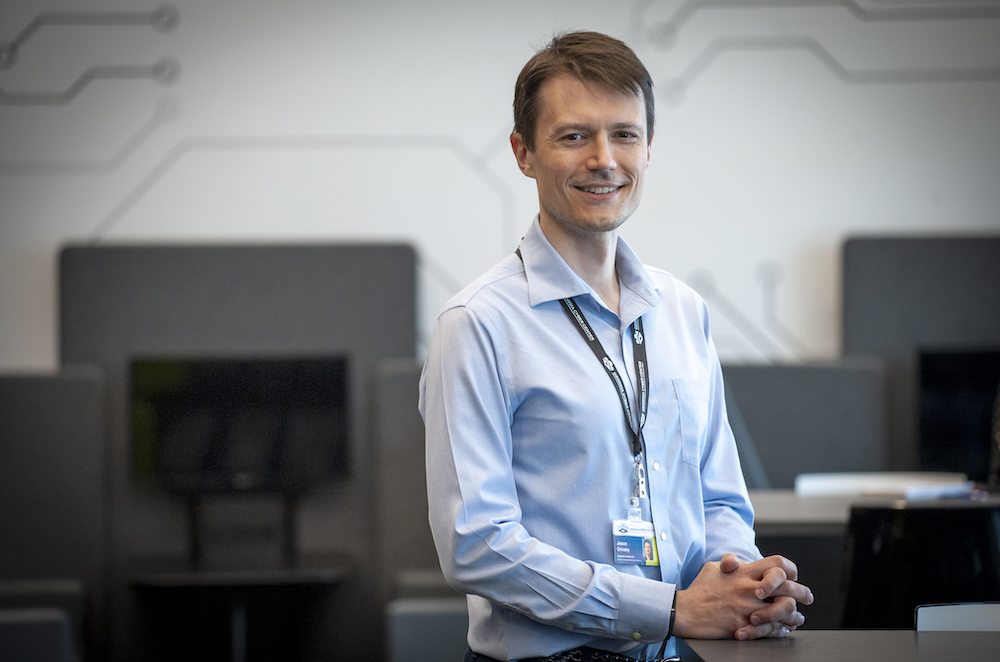
Dr. Carrie Reif-Stice is a new assistant professor in the Department of Communication who has a primary area of study in health communication. Reif-Stice said she is thrilled to be joining the faculty at Augusta University because she considers this city her home.
“I grew up in Augusta and my family is still in the area,” Reif-Stice said. “I attended LaGrange College for my BA and Auburn University for my master’s in communication with an emphasis in public relations. After graduation, I was a lecturer at Troy University in Troy, Alabama, until I went back to school to complete my education.
“I earned my PhD from the University of Southern Mississippi in communication studies with an emphasis in risk and crisis and health communication.”
For the past three years, Reif-Stice has been an assistant professor at Columbus State University in Columbus, Georgia.
When it comes to health communication, as well as risk and crisis communication, Reif-Stice said these are important tools and skills to have when dealing with the public.
“At some point, individuals will encounter an unexpected natural or man-made crisis that will create high levels of uncertainty and feelings of perceived threat. Crisis communicators use communication as a tool to create and disseminate messages that convey critical information to stakeholders,” she said. “When messaging is effective, crises can be prevented, mitigated and better managed.
“In other words, in a critical situation like tornadic weather, how the public perceives risk can influence how they respond to watch and warning messages. Ineffective messaging can result in significant consequences for stakeholders, such as reputational harm, loss of life and destruction of property.”
A perfect example of the importance of conveying accurate and precise information to the public is the current COVID-19 pandemic.
“As we have seen with the COVID-19 outbreak, risk and crisis communication strategies are intertwined with health communication,” she said. “Health communication scholars recognize that effective communication is vital to creating and fostering health programs that address disease prevention, improve quality of life and advance health-related decision-making.”
Well-developed health messages can facilitate how individuals handle uncertainty and fear and engage in health behavior changes. In addition, health communication messages can foster health advocacy and government policies, Reif-Stice said.
Considering the Medical College of Georgia is the state’s only public medical school, Reif-Stice believes her courses in health communication will help prepare future medical students to openly communicate with their patients.
“Courses in health communication play an instrumental role in improving patient care,” she said. “When medical professionals are trained to effectively communicate, patient well-being significantly improves. Communication skills also minimize medical errors and reduce overall medical costs.
“As an assistant professor at Augusta University, I hope to build partnerships that will give students an opportunity to gain real-world experience in a safe learning environment. I also hope to provide students with skill sets that enable them to communicate, advocate and engage in effective health decision-making.”
Dr. Taylor Walker is also a new assistant professor in the Pamplin College of Arts, Humanities, and Social Sciences who specializes in health and organizational communication. She received her PhD in health communication at Ohio University and received her master’s degree in communication at the University of Cincinnati.
Her research is primarily focused on how embodied differences and storytelling surrounding health and healing are constructed, shaped and constrained through communicative practices.
Walker said she explores how storytelling can foster inclusivity, promote dialogue and drive action toward progressive social change within and across health contexts.
“Health communication is important because we all experience health and healing,” Walker said. “We talk to our doctors, we experience grief and loss, we watch medical dramas on television, we share our diets and exercise routines with our friends and so on. In addition to universally experiencing health and healing, we all inherently live through stories.
“Therefore, exploring how we talk about, perform and experience health becomes foundational in understanding how we live our lives.”
In addition, health communication research offers scholars a way to study the individual, community, organizational and global aspects of health by considering how patients and physicians interact, she said.
“From my own research, health communication can offer us ways to see how medical schools can better prepare future doctors to work with underserved communities and how storytelling fosters social change within health contexts,” she said. “The connection between health communication and medicine is beneficial in a variety of ways. First, having medical students incorporate communicative practices in their training shifts their orientation as future physicians to consider how patients perceive and understand their own health and develop partnerships with the communities they serve.”
Secondly, the interdisciplinary relationship between communication and medicine offers a unique space to address disparities within and across health care, Taylor said.
“We can develop more inclusive, community-centered health interventions, partner with communities who are often at the margins of health and healing and create a more socially just healthcare system for both patients and physicians,” she said, adding that she hopes to develop partnerships between the Department of Communication, the Medical College of Georgia and the surrounding community. “I believe these partnerships could connect theoretical learning with professional and personal goals.”
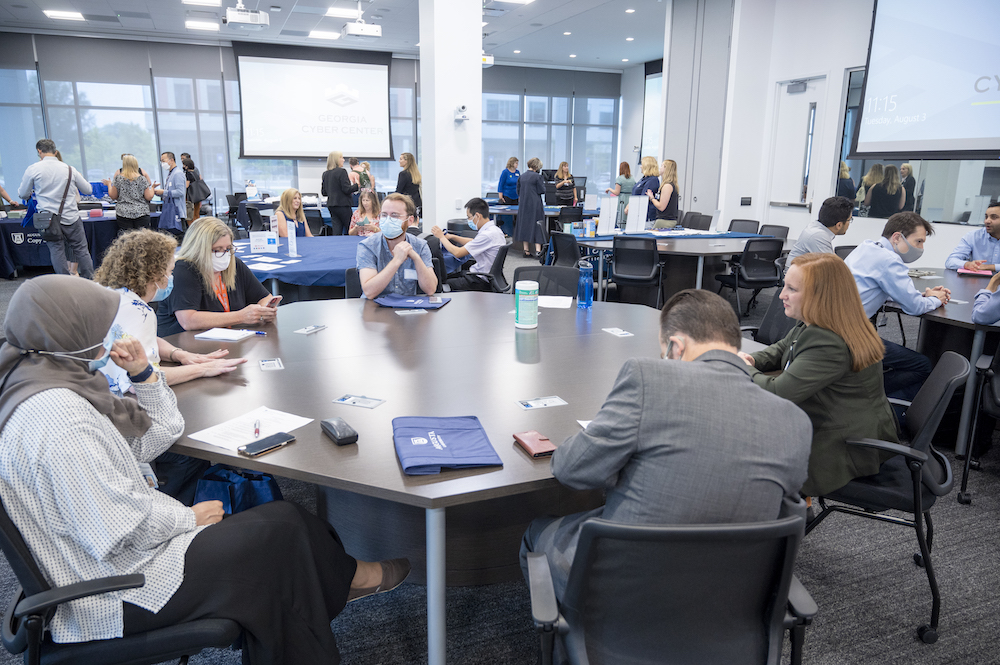
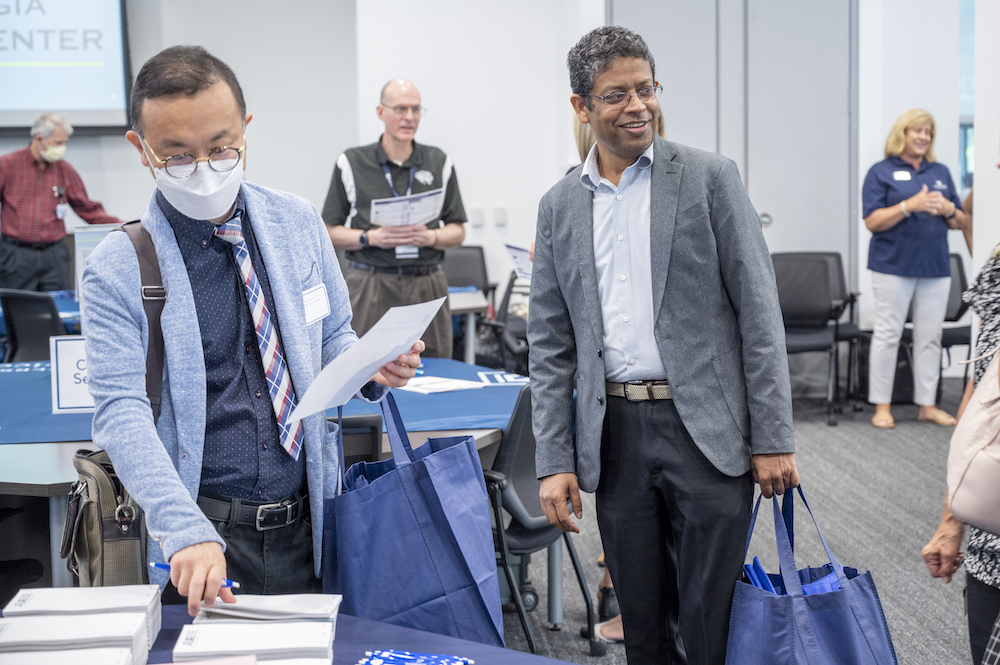
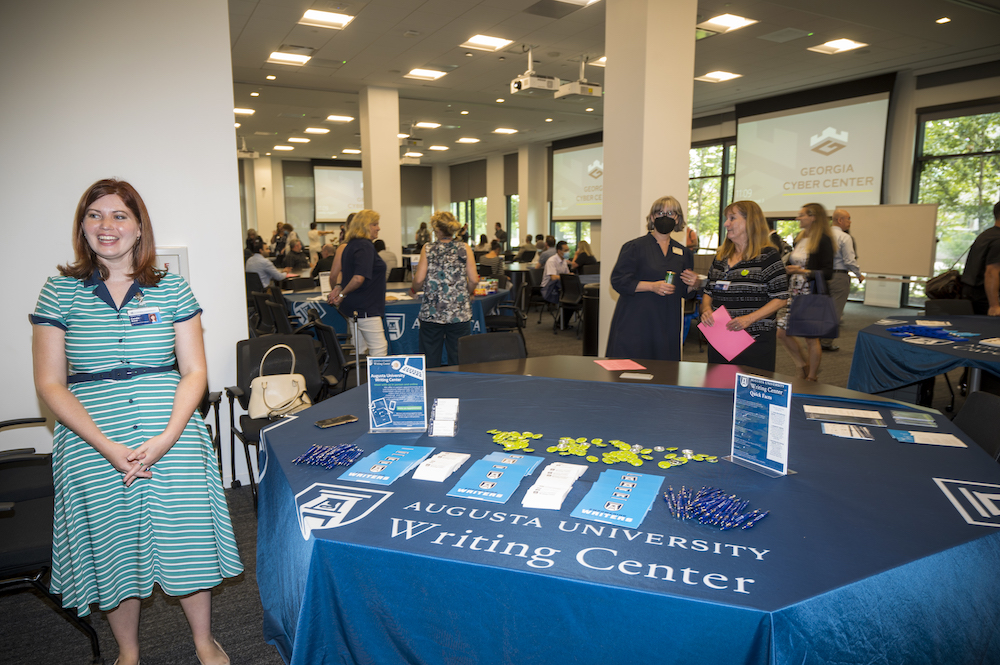
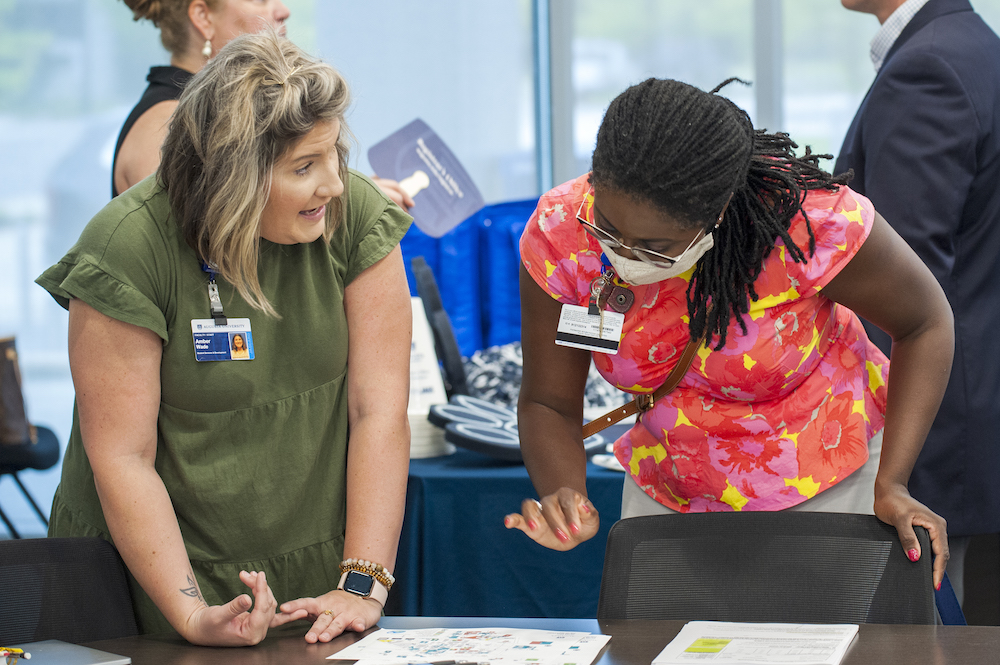
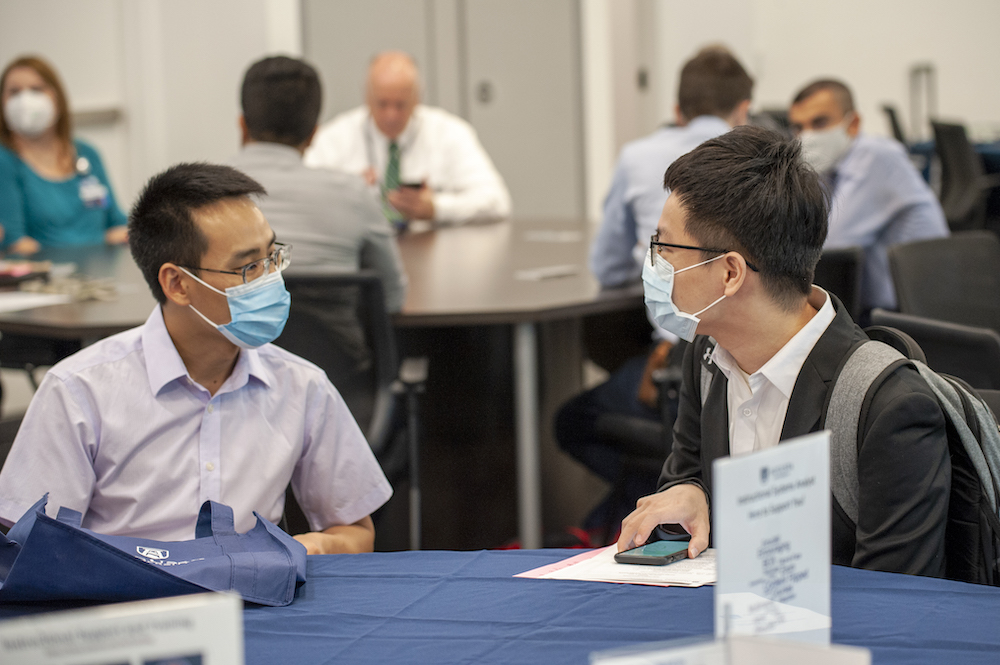
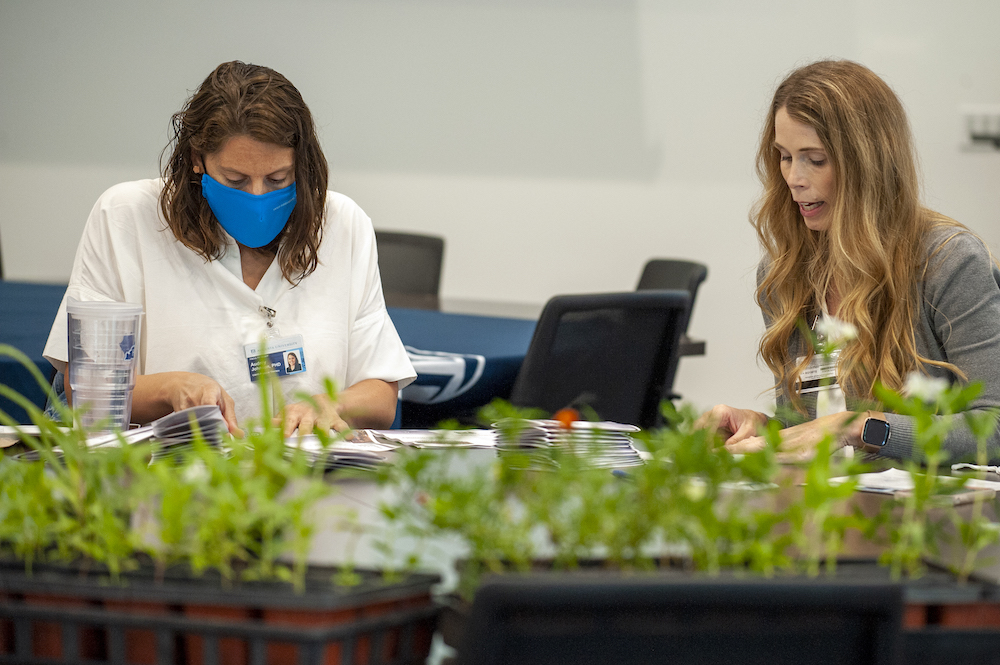
Ghazal Foroutan, who was born and raised in Tehran, Iran, has studied graphic design since she was 16 years old.
She won a well-known international student competition called the Khwarizmi Youth Awards in 2012 for her illustrations, which led to her being accepted to one of the best schools in Tehran, Alzahra University.
Due to her tremendous success in the international student competition, she was not required to take the entrance exam to attend this prestigious university, she said.
“I studied graphic design in Alzahra for four years and meanwhile worked at the studio based in Tehran called Studio Shizaru for two years,” Foroutan said. “Working at this studio, I gained the experience I needed in the professional field. After graduating with my bachelor’s in fine arts, I decided I want to pursue my career and education in the United States and started applying to programs with a Master of Fine Arts.”
In 2018, Foroutan moved to Stillwater, Oklahoma, to begin an MFA program at Oklahoma State University. After three years of training, she graduated in May with an MFA in graphic design.
Following graduation, Foroutan proudly accepted a position at Augusta University as a new assistant professor in the Department of Art and Design.
“This is an excellent opportunity for me to be able to teach in such a diverse and growing community,” Foroutan said. “I am glad I was given this chance and I hope to bring all my enthusiasm and passion for art to Augusta University.”
Foroutan hopes to mentor art students much like her parents who inspired her as a child growing up in Iran.
“I grew up in an artsy family,” Foroutan said. “My father is an artist and designer. He has always been encouraging me to draw, do crafts and make art. My parents were the ones who recognized my talent in art and pushed me to choose graphic design as my major in high school, which was the best choice I made in my life.
“At first, it was hard for me to keep up with the load of heavy homework but, after a while, I was enjoying every second of it. Since then, I grew fond of creativity, art and design each and every day.”
Foroutan believes her life experiences can provide guidance to the next generation of artists and graphic designers here in Augusta.
“My hope is to widen the art and design canon by bringing the discussion of Middle Eastern and Eastern history to the classes,” she said. “I want the students to be more involved with their community and help make Augusta a center for arts by encouraging them to think more outside of the box and expand their creativity.”
